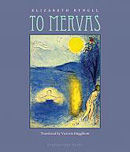

Archipelago Books, paperback, 9780981987378
It came as no surprise to discover that Elisabeth Rynell is a poet as well as a novelist; as I read To Mervas I had the sense that every single word had been carefully chosen to paint a particular picture, that no other word would do, and that they were all equally important. (Hats off to translator Victoria Häggblom for allowing me to have that impression without the privilege of reading the original Swedish.) The only way to enjoy a novel like this was to slow my reading pace right down and savour it, and I constantly found myself re-reading snippets just for the pleasure of it.
If the language is beautiful, the subject is as bleak as anything I've read in a long time. Middle-aged Marta is jolted out of solitude by a letter (is three sentences "jotted down on a piece of copy paper" a letter? To Marta it's a lifeline) from the love of her life (because there's been no other love at all) after twenty years apart. Kosta tells her he's in Mervas, which, we discover along with Marta, is an abandoned mining town way up in the Swedish wilderness.
Months later, with no idea of whether Kosta is still there or what she'll find there, Marta walks out of her city life— not that she has much to leave—and sets out for Mervas. The wilderness she sees outside is a cruel reflection of the wilderness inside her as she reflects upon her life, a hard one by anyone's reckoning, yet Marta shows not a trace of self-pity. Whilst chapters of her life have been nothing short of tragic—the physical and emotional abuse she suffered as a child, the hardship of raising a handicapped son, the depression she fell into after his death—what I found most moving was her final argument with Kosta, and the sense that our fates hang on such moments. I had the feeling that Kosta represented her chance to outwit fate and escape the legacy of her miserable childhood – but a stupid argument, and two proud people with their entrenched positions on an emotive issue, snatched away that chance and changed her life forever. If only one of them had backed down....
On her way to Mervas Marta meets a couple who bewilder her by offering shelter, food—and friendship. Distrustful at first, Marta gradually thaws in the gentle heat of their constant kindness, and starts to realise just how far from normal human behaviour her self-imposed isolation has taken her. The couple have their own sad story which Lilldolly, the woman, confides in Marta, who, distant from other human beings for such a long time, is at a loss as to how to react. Unlike Marta, they live peacefully alongside their loss, instead of letting it take over their lives.
Does Marta get to Mervas? You'll have to read it yourself to find that out, but I will say that the ending brings redemption and hope, although, as befits such a bleak novel, only in small, realistic doses. They don't live happily ever after here, but they do live—and just for a moment, they might even be happy.
